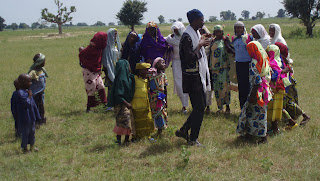Danjuma, our Hausa guide, had asked (and paid) the Fulani to demonstrate one of their marriage ritual ceremonies for us. This ceremony is called the Sharo and it's a test of bravery and courage for a potential bridegroom to prove himself worthy of a bride. These Fulani obviously don't have a dramatic tradition, because they seemed to think it was kind of funny that they were "pretending" this ceremony. The women would dance a bit and then look at each other and laugh like this was really silly. So it was always clear to us that this was not for real, but it was still fun to see them all dressed up and get a glimpse of what this ritual involved.
Those Fulani not participating in the ceremony were also interested observers.


At the beginning of the ceremony there were several young girls dressed up -- they were the potential brides. A person who wrote up a report on a previous Nigerian Field Society trip visiting the Fulani where they had seen this ceremony for real had more information about it than we received. That report said:
"Our guide, told me the bride would be about eleven years old and that the bridegroom would be about seventeen. Two months before this event the bride would have undergone female circumcision ….an abhorrent tradition. I was also informed that brides can be as young as eight years old. The bride cannot marry a young man who will not bear the Sharo beating. The brides need to be very young because otherwise they may become flirty as they get older and then the family will be disgraced and the Bride’s father not receive a Bride Price!! When a father is not agreeable to a marriage he will demand an impossible bride price. "
[I need to interject here, that in my internet research, I found conflicting information about the Fulani's practice of female circumcision -- some sources say they practice it and others say that do not -- so I can't say for sure that these people do practice this custom. ]
The girls followed the musicians around while a line of older married women sang and danced.


Then the Sharo (beating of the bridegroom) demonstration began. This is not officially allowed by a law dating back to British colonial times - so it is not now as fierce as it may have been in the past. It started out with the lead singer guy sounding like he was giving instruction to the young man who knelt before him ready to submit to the beating.


Here's the report from the observer of the actual ceremony:
"Now the Sharo ceremony commenced - this is the beating of the prospective husband ….to show that he is brave enough to defend his new bride. In all there were three young men competing for the bride and during the beating and after they must show their bravery by not crying out or showing any reaction to the pain inflicted. The first young man sat on a stool before us and took off his shirt and covered his body with a cloth and an apron of leather. Meanwhile, there was a lot of swishing of sticks. After receiving encouragement from a friend to be brave; lots more dancing by the men of the village; followed by a group of young girls which included the bride - the striker with a great flourish struck the young bridegroom across the ribs - the young bridegroom bravely bore the pain and the welt was shown to us all. Some young girls sat near the feet of the prospective bridegroom to ‘wipe away the pain‘ (fortunately no blood). There was a lot of noise throughout and the elders were whipping back the encroaching crowd. Another young man took his place on the stool and there was more dancing by the young men of the village - again the young girls danced and with another flourish the striker struck this young man…who then showed us all the welt where he had been hit. More dancing.... Now a third young man took his place on the stool and removed his shirt, but this young man did not have the courage to bear the beating and needs to return another year when he has more strength.. The first bridegroom took another beating and he would win the bride. The Bride’s father makes an agreement with the prospective Bridegroom’s father about Bride Price which can be anything between N10,000 and N100,000 plus cattle." [That's $85 - $850]



No comments:
Post a Comment